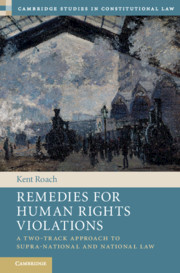Book contents
- Remedies for Human Rights Violations
- Cambridge Studies in Constitutional Law
- Remedies for Human Rights Violations
- Copyright page
- Brief Contents
- Contents
- Acknowledgements
- Table of Cases
- 1 The Importance and Complexity of Remedies
- 2 A Two-Track Approach to Individual and Systemic Remedies
- 3 Interim Remedies
- 4 Remedies for Laws That Violate Human Rights
- 5 Damages
- 6 Remedies in the Criminal Process
- 7 Declarations, Injunctions and the Declaration Plus
- 8 Remedies for Social, Economic and Cultural Rights
- 9 Remedies for Violations of Indigenous Rights
- 10 Conclusion
- Select Bibliography
- Index
8 - Remedies for Social, Economic and Cultural Rights
Published online by Cambridge University Press: 29 March 2021
- Remedies for Human Rights Violations
- Cambridge Studies in Constitutional Law
- Remedies for Human Rights Violations
- Copyright page
- Brief Contents
- Contents
- Acknowledgements
- Table of Cases
- 1 The Importance and Complexity of Remedies
- 2 A Two-Track Approach to Individual and Systemic Remedies
- 3 Interim Remedies
- 4 Remedies for Laws That Violate Human Rights
- 5 Damages
- 6 Remedies in the Criminal Process
- 7 Declarations, Injunctions and the Declaration Plus
- 8 Remedies for Social, Economic and Cultural Rights
- 9 Remedies for Violations of Indigenous Rights
- 10 Conclusion
- Select Bibliography
- Index
Summary
Concerns about manageable remedies have been a major impediment to recognition of socio-economic and cultural (SEC) rights. Part I examines remedies available for SEC rights violations in supra-national and domestic courts including interim remedies, suspended declarations of invalidity and other remands to legislatures, damages, declarations and injunctions. Part II argues that individual remedies should not be rejected because of concerns that they may result in inequitable queue jumping. Part III examines the role that proportionality principles and reasonableness review can play in justifying delays and limits on SEC rights. including in emergencies. Part IV examines South African engagement remedies. Although they can result in consensual and creative agreement, they can also be used as a means to limit rights and authorize evictions. Courts should address inequality of bargaining power including through the use of interim remedies. Part V suggests that South African courts are taking a two-track approach when they combine anti-eviction remedies with more dialogic systemic remedies including engagement. The relation between individual remedies and the minimum core of SEC rights is explored, as is the importance of individual remedies in responding to remedial failure and triggering cycles of reform.
Keywords
- Type
- Chapter
- Information
- Remedies for Human Rights ViolationsA Two-Track Approach to Supra-national and National Law, pp. 408 - 453Publisher: Cambridge University PressPrint publication year: 2021
- 1
- Cited by

